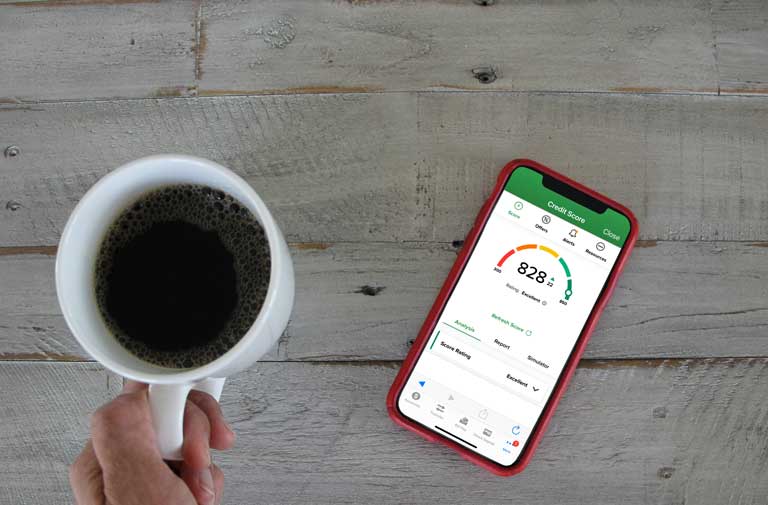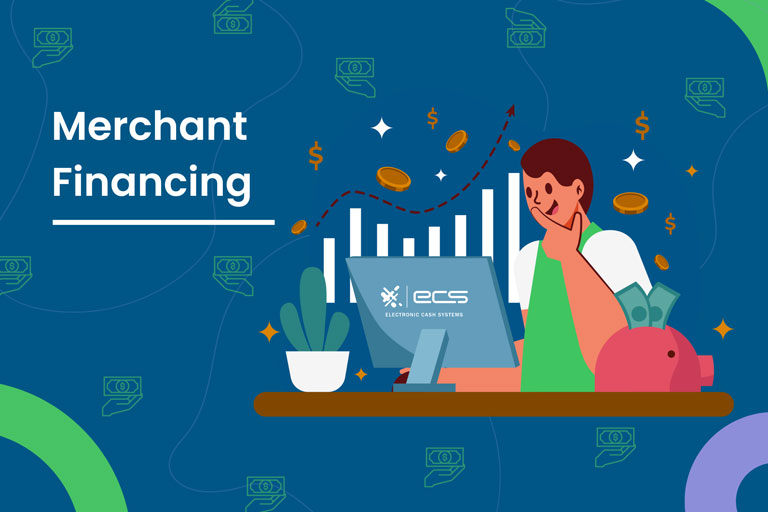In any business endeavor, financing can play a key role in the ability to grow. Merchant financing loans, otherwise known as merchant cash advances, are one way our company, ECS, helps our small-business owners acquire the capital they need to succeed.
If you are a merchant in the United States or Puerto Rico in need of quick cash, payment processing, or lending opportunities for advancements, investments, and even start-up funding, this article is for you. We will analyze your merchant financing opportunities in-depth and share tips to help you better understand this option.
What is Merchant Funding?
Many would assume that receiving loans could only be done through a bank or specific lenders. However, business loans through credit card processing companies are quite popular. A merchant cash advance is a funding option that a business can utilize to gain working capital fast.
Small to medium-sized businesses can benefit from merchant funding, merchant financing, or cash advances as an alternative to traditional bank loans. Merchant cash advance financiers provide lump sum funds upfront to business owners. In exchange, the business’s daily or weekly credit card sales repay the advance at a fixed percentage.
Merchant Cash Advance vs Small-Business Loan
So what is the difference between merchant funding services? With any business loan, lenders look at credit scores, credit history, and numerous other factors to approve their lending services. Whereas, merchant cash advances are a quick and easy alternative with no need for collateral, regardless of a business owner’s credit score.
With merchant financing services far less stringent criteria, merchants can escape the bureaucracy of in-depth loan systems. If an applicant has poor personal credit and little to no credit in their business portfolio, quality sales numbers can assist merchant cash advance (MCA) providers in determining a merchant’s reliability to pay back their advanced funds. The terms of the advance such as the amount, payback time, and interest rate are all valued differently per each merchant’s daily transactions.
Because of this, merchants can receive instant funding with credit history playing no factor in gauging creditworthiness. Because a merchant cash advance is not a loan, credit bureaus will not receive any reporting from MCA providers. Conversely, timely repayment of merchant cash advances will not play a role in building credit.
However, because merchant cash advances have flexible approval terms, they come at a higher cost. A merchant would need to decide if getting quick cash almost instantly outweighs a higher price tag than a standard loan.

Credit Card-Based Merchant Financing
Once you determine the amount of funding you need, you can apply for merchant service financing. Merchant service companies provide merchants with the tools and processing platforms needed to run credit card transactions.
Merchant financing through credit card processing loans is a great option if you are in need of a payment processing provider and quick cash. You may already have a merchant service provider that offers cash advances. If you need immediate funding, reach out to your current provider.
Ultimately, merchant services card processing and cash advance agreements are linked together. Merchant cash advances with credit card-based financing make repayment easy and automatic.
To repay a merchant cash advance, daily or weekly batch settlements will have a holdback applied at a fixed rate. Meaning, that a set percentage of a merchant’s sales is withheld from their bank account.
The fixed-rate percentage typically ranges between 10-20%. The higher the credit card transactions are for the day, the more funds are held back from settlement to the merchant, and the quicker the business’s cash advance is paid back.
Conversely, less money is withheld if the merchant makes fewer sales on a given day. For example, no fees are taken out if the shop is closed on weekends or holidays. During these periods, the advance will take longer to pay back.
ACH-Based Merchant Financing
If you need a quick cash advance, and you do not run credit sales, there are still merchant financing options available to you with ACH-based merchant financing.
With ACH-based merchant financing, your repayment is not based on your daily sales. Rather, you will be automatically debited from your merchant bank account via ACH. This option could be preferable as you can avoid the need to be able to accept credit cards or switch payment processing companies.
The merchant will know how much money will be debited at any given time with these types of repayment plans. This makes it easier to know when the balance due will be fulfilled.

Qualifying for a Merchant Cash Advance
Applying for a merchant cash advance is straightforward. The first thing that must be established is a relationship with a payment processing company. Once you have an established merchant account with your provider, you can contact their customer support or your sales rep to inquire about a merchant cash advance. Keep in mind, not all, in fact, many don’t offer merchant cash advances. However, companies like ECS are happy to offer their merchant’s easy approval merchant cash advances.
Your provider may require you to provide evidence of your driver’s license, credit card statements, bank statements, possible tax returns, and proof of your business’s income with your daily credit card receipts. However, in most cases, you will not have to show years of experience in operation or even healthy credit scores.
Most MCA providers have a high approval rate for qualifying cash advances. The ultimate determiner of a qualifying merchant is their number of credit card sales. If a business batches out a higher amount of credit card transactions, this ranks higher for a financier than credit ratings or the age of the business.
This does not necessarily mean if you are a new business with no steady sales to prove that you won’t qualify for an advance. Your best bet is to reach out to your payment processor and inquire the best way to move forward with merchant financing for your business.
Can I Qualify for a Merchant Cash Advance with Poor Credit?
The beauty of a merchant cash advance is that even bad, little, or no credit won’t prevent a merchant from gaining the assets they need for their business. MCAs are not typical bank business loans. Financiers are more concerned with credit card sales as evidence for approval than with personal or business credit portfolios.
If you do have poor credit, however, you may have trouble securing a merchant account with the payment processor of your choice. That is because payment processors do look at credit scores in their underwriting process to approve merchants for accounts. If you have poor credit history, you may only receive approval for a high-risk merchant account.
Keep in mind, there are always ways to improve your credit score in an effort to be qualified for a low-risk merchant account. The benefit? Lower payment processing fees and more flexible contracts and processing stipulations.
Merchant Cash Advance Advantages
Merchant cash advances have a few advantages. Including making money accessible to some business owners that otherwise may not be able to move forward in their business endeavors. This could be due to elements such as time, credit history, and difficult approval requirements. The value that merchant cash advances bring may outweigh those of standard business loans.
Moreover, merchant cash advances are extremely flexible. They can be used in several ways to support business owners that not only want to progress but can help merchants who may be in financial binds.
If there is an unanticipated decrease in cash flow, advanced funds can be used to cover expenses, payments due, increased operating costs, covering payroll, buying new working equipment and supplies, and any other needs. Because MCAs can be easily accessed so quickly, they can be a good option for temporary working capital.
Merchant cash advances offer quick access to cash. But additionally, they offer automatic repayment systems, easy qualification regardless of credit history, cash use freedom, and more. Let’s take a look at all the benefits merchant cash advances have to offer in further detail below.
Quick Access to Cash
Merchant cash advances are one of the fastest avenues for merchants to access the cash they need. same-day approvals are frequent and funding is generally granted in as little as 24 hours up to 72 hours.
Automatic Repayment System
In standard business loans or lines of credit, repayment terms can become easily troublesome. Borrowers have to remember to pay back their minimum dues. Paying back these funds can oftentimes become time-consuming, forgotten about, or the borrower may not be able to afford the minimum payment or balance due. In the end, late fees and non-compliance can cause risky additional expenses to the borrower.
With merchant cash advances, payment is automatically deducted from daily sales that would have otherwise been deposited into the merchant’s bank account. With this system, the merchant never sees the funds hit their account. This convenience reduces the responsibility of the merchant to remember to pay back their dues.

Easy Qualification Regardless of Credit History
Credit plays no factor in a merchant’s advance approval. This is a huge benefit for merchants who need access to funds immediately but have an unhealthy credit score to positively gauge creditworthiness on standard business loans. The qualification also requires no collateral, other than future sales percentages.
Cash Use Freedom
Merchant cash advances afford business owners the freedom to use their funds at their discretion. MCA providers typically do not place stipulations on how the merchant is to use their funding.
Merchant Cash Advance Disadvantages
Merchant cash advances have their pros, making it the right choice for some. However, there are also a few drawbacks that may make you rethink if a cash advance is the right funding option for you. These disadvantages may include disruption of cash flow, no building of credit, and being stuck with a credit card processor that you may not be fond of. Let’s take a closer look.
Disruption of Cash Flow
Though merchant financing can help build your business–or at least keep it afloat, they also significantly impact your daily settlement amounts and cash flow. With daily repayment percentages automatically removed from batch settlements, merchants may see a lack of profit.
Oftentimes, when utilizing business loans, some borrowers may opt to delay repayment to rearrange their cash flow. However, with the automatic repayment system attached to merchant cash advances, business owners are not afforded this option.
Let’s take this example as a dose of perspective. A payment processor typically holds back 10-20% of a merchant’s daily batch with a merchant cash advance. So let’s say your MCA contract is set to hold back 15% of your daily settlements. If you made 1,000 that day, $150 of your income would be paid back to the processor instantly. That may mean an employee’s full day of wages is not met by your day’s work. Which can make catching up with business costs difficult.
Costly Buy Rates
Because merchant cash advances require no collateral, no credit history, and no wait times to receive funding, the flip side is costly buy rates. The rates for an approved merchant cash advance can range between 40% – 350%. The more affordable option of a standard small-business loan from a bank would range from 3.19% – 6.78%. Business lines of credit can vary from 10% – 99%.

Credit is Not Built
Even with timely repayments, credit is not affected. Because financiers do not use credit for approval, they do not report payment history to credit bureaus. If a merchant is looking to build their credit profile, merchant cash advances will not offer this opportunity.
Unwanted Credit Card Processing Platforms
Agreeing to the right merchant cash advance can be tricky. When you agree to a credit-card-based advance you must be a merchant able to accept credit cards. To accept credit card payments, you must also sign a contract with an MPA provider that is a credit card processor. If a business owner is not careful when reviewing their contract, they may be locked into unwanted terms with a merchant processor.
What About High-Risk Merchant Funding?
So, we’ve gone over merchant funding options for standard businesses. Typical low-risk merchants who have fair, good, or excellent credit will generally have no issue gaining access to the funding they need.
However, merchants who are high-risk or business owners with poor credit scores may not have the same story. Loans are available to high-risk merchants but the lender is labeling these loans based on less-than-ideal client criteria. And because of that, high-risk loans come with some consequences that traditional financing may not have.
Less-qualified borrowers pose a threat to lenders. Because a financier’s ultimate goal is to get their money back plus make money on the accrued interest, giving a loan to a business owner with a poor credit history or a lack of a financial track record makes it a more challenging process.
What Do Lenders Use For Qualification?
To determine a merchant’s qualification for business financing, lenders will look at the business owner’s personal credit score, the business’s history, credit history, and annual profits and revenues to name a few key items.
In most cases, financers have pre-set minimums for each of their qualification criteria. If an applicant meets the set qualifications at their bare minimum, they may qualify for a high-risk business loan. If the qualification criteria are exceeded then, a merchant may qualify for a lower-risk or standard business loan.
In most cases, a merchant would qualify for a high-risk loan if they meet any of the below factors:
- A poor personal credit score
- A new business with little-to-no profit history
- Low annual revenue and profit margins
- High-Risk Industry Status
- Is High-Risk Financing More Expensive?
If a financier agrees to take on a risk in lending to a “high-risk” merchant, there are without a doubt going to be financial consequences that you will incur to pay for the risk the lender is assuming.
Because of the risk involved, high-risk loans for businesses almost always coincide with inconvenient loan terms with expensive interest rates. So, if you meet any of the above criteria such as poor personal credit is low, a young business, low annual revenue, or all the above, then you will most likely experience higher interest rates and APRs, small loan dollar amounts, and short repayment term lengths on any qualifying high-risk business loan.
Types of Loans For High-Risk Businesses
There are multiple avenues to acquire funding from a lender. And qualified loans may vary from lender to lender. But there are certain financing options that high-risk businesses are more commonly approved for.
Let’s take a look at the common business loan categories that are referred to as “high risk.”
Merchant Cash Advances
If a merchant is unable to qualify for a standard business loan, they may, however, be approved for a merchant cash advance. These types of advances can be made available to less-qualified businesses because the repayment money will come directly out of the merchant’s daily credit card sales with their payment processor.
However, even though this option may be available to high-risk merchants there are still minimum qualifications a business must meet (depending on their payment processor) to qualify for approval.
Short-Term Loans
The next funding option for high-risk businesses would be a short-term loan. Short-term loans are a more condensed alternative to a traditional loan. Consequently, they can have higher interest rates and tougher qualifications.
Personal Loans
Lastly, a high-risk business owner could look at obtaining a personal loan for their business. In most cases, it is not recommended to mix business with personal finances. It can impact personal finances, something that’s harder to come back from, should things turn sour on the business’s end.
But if you have no other options and are in need of the funds, a personal loan, used for your business could be a quality option if your business is new with no history of annual revenue to show a lender. However, in many cases, with a personal loan, you will still need to have a decent credit score.
How to Choose the Right Merchant Financing Provider
There are numerous MCA financiers and merchant lenders to choose from. Merchant funding can be taken out as business loans from banks or financial institutions, or you can receive all your merchant funding services from some payment processors.
It may be beneficial to look into a merchant service provider (payment processor) that offers merchant financing. You may have some leverage if you couple your payment processing services with your financing platform. To select the right fit for your business, you can evaluate your options based on the following criteria:
Principal Amount Financing Limits
The first step you must take when looking into merchant financing options is determining how much cash you need. Different providers will be able to offer you more or less depending on how established they are as a financier. These amounts can range between $2,500 to $1 million. If the provider does not have the means to offer you what you need, you can move on to your next choice.
Payback Payment Period
The payback period is how long you have to repay the advance. This can range from three months to two years. The sooner you pay off an advance, the sooner you can get to making more profit for yourself. Keep in mind that shorter payment periods may result in difficulties yielding profit while you pay back your borrowed funds. You will need to factor in everything before knowing which payment period you will be able to afford.
Holdback Percentage
The holdback percentage is the fixed-rate percent of daily or weekly sales that will automatically be withheld from your credit card settlements. This percentage will remain the same until the advance is fully paid off.
These fixed rates can range between 5%-20%. Higher holdback percentages may decrease the time it takes to pay off the advance, however, they may also negatively impact daily profit.
Factor Rates
Factor or buy rates are different from holdback percentages. These rates are the additional fees paid back on the principal amount borrowed. MCA providers may offer different buy rates for different merchants. These rates can range from 1.09 to 1.5.
If you have a 1.5-factor rate, you will pay back $1.5 on the dollar. For example, if you borrow $1,000, you will pay back $500 additionally, so the total paid back on a $1,000 advance with a 1.5 buy rate is $1,500.
These rates will vary based on the information provided on the application. Factors such as the age of your operation, your credit card statements, and bank statements all help the financier determine your potential risk level.

ECS Merchant Cash Advance
At ECS, we offer our merchants and potential clients easy merchant cash advances to keep their businesses growing. Our underwriting and approval process evaluates the risk and creditworthiness of your account with your projected credit card receivables and daily credit card receipts with the evidence provided on the application.
This will determine the amount of money we can fund you and the time it will take to repay those specific funds. ECS’s merchant cash advances offer the following pros for your business:
- Quick and easy application process
- Same day approval
- Automatic renewal approval
- Funding options from $10,000-$200,000
- Automated daily repayment schedule
- 6-18 month payback periods
- Zero prepayment penalties
- Buy rates at 1.15 and 1.49
Can I Get Out of a Merchant Cash Advance?
Getting out of a merchant cash advance is not always the easiest feat. The best way to end your cash advance payments is to pay back your principal and buy rate in full. This, however, may not be an option for some.
If you chose to apply for merchant financing due to a weak credit profile and realized soon after, the cash flow burden was too much to keep up with, you may be looking for alternative routes your business can support to fix your financial concerns.
One option to pay off your advance is to apply for an alternate financing option with a lower interest rate. In most cases, merchants opt for MCAs when credit is poor, which means finding an appropriate small-business loan may prove difficult still. Most small-business loans require a personal credit score of 650 or higher.
Additionally, you can opt for an asset-based loan. When opting for this type of financing, merchants will be putting their business, accounts receivables, real estate, and any inventory on the line.
Another option that may work in your favor would be looking into merchant grant funding options. The federal government has thousands of grants available to small businesses. Yours may qualify for funding.
Unlike a loan, a grants program offers monetary gifts that do not need to be paid back. Grant Approval would benefit your business’s cash flow tremendously and would allow you to pay back your merchant financing.
What if I Default on a Merchant Cash Advance?
Let’s face it. Defaulting on any financing program or loan is never a good idea. Avoid defaulting on financing at all costs. Why? Let’s break it down.
First, you will most likely be required to sign a personal guarantee when you sign off on a merchant cash advance. This means a financier will be able to pursue any personal assets, including your business, your professional and personal bank accounts, your house, cars, and even file a collection lawsuit to regain their advance funds.
Additionally, even though credit bureaus do not receive reporting on advance repayments, they will receive information for defaulted advances. This may not affect your credit but could make it more difficult for you to receive any future merchant financing. Ultimately, defaulting or failure to pay back your merchant funding could significantly impact both your financial and personal well-being.

Alternatives to Merchant Cash Advance
If a merchant cash advance does not seem to fit your funding needs, you can look into alternative options such as a small-business loan, short-term loan, or a line of credit. With these avenues, you will need to be able to provide good credit history to show your reliability and prove you are not a high risk to the lender. Credit bureaus will receive reporting for these types of lending services. With reliable repayment, you will be able to build your credit further.
You can speak to a merchant financier about your options. At ECS, we can assist you in determining which avenue would be the best route to take for your needs. One of our highly knowledgeable sales representatives would be happy to chat to get you the funds your business requires.
Please contact one of our knowledgeable account representatives for more information about merchant cash advances and to see if they are a good fit for you.
To contact sales, click HERE. And to learn more about ECS Merchant Financing visit Lending.
